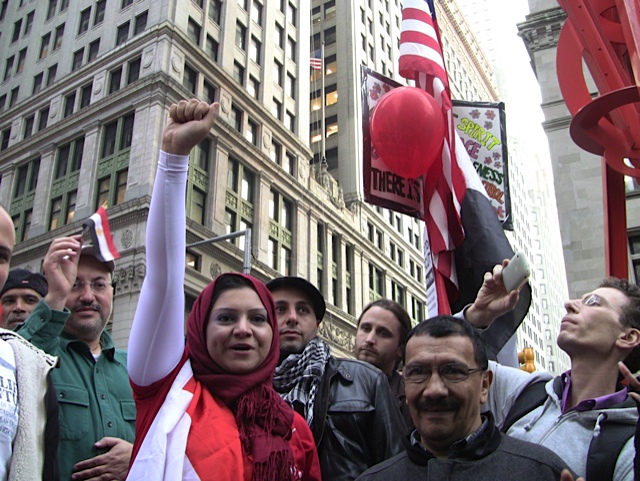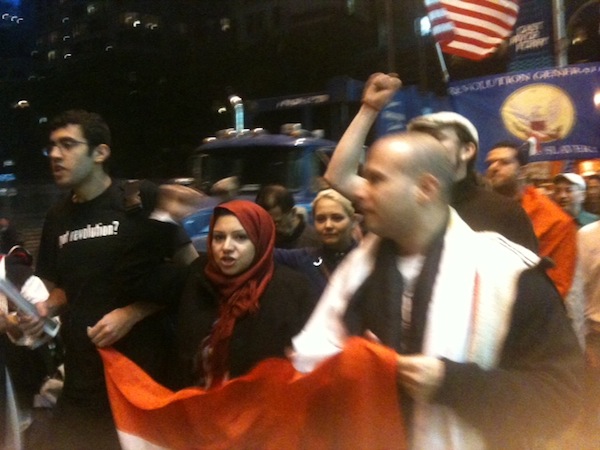From Tahrir to Wall Street
It was supposed to be a master class in revolutionary activism: two stars of the Tahrir Square uprising visiting Occupy Wall Street to swap tactics and sass. It ended up more like an undergraduate teach-in.
For Asmaa Mahfouz and Ahmed Maher, the visit to Zuccotti Park was an exhilarating – if surreal – break from the punishing workload of fighting the military dictatorship back home in Egypt.
“Where is the tear gas?” Maher asked with a smile, but he seemed genuinely puzzled by the cordial relations between the Wall Streeters and the cops.
Maher and Mahfouz both have been arrested before by Egypt’s notoriously abusive police, and Mahfouz recently was hauled before a military court martial for allegedly insulting her country’s military rulers.
Mahfouz had a question of her own. “Where are the organizers?” she asked. “There must be organizers.” No one knew. She ended up chatting at the welcome table with a young man wearing a straw hat.
“How do you sustain yourselves? How do you keep yourself energized?” he asked. “That’s our main problem.”
“You need a message,” she told him.
She inscribed an Egyptian flag (“From Tahrir Square to Wall Street”) with black marker and presented it to the hundreds who gathered to hear her and Maher.
Mahfouz, 26, spent years protesting when most Egyptians stayed home, and became a phenomenon with her self-produced YouTube editorials. She lambasted rulers with homespun humor, and exhorted people to join her at protests. Eventually they did, in the millions.
Maher, 31, worked with virtually every activist group in Egypt, and founded the April 6 movement, which was instrumental in organizing textile worker strikes in 2008. His grassroots political organization boasts the kind of street muscle and labor ties that Occupy Wall Street still only hopes to build.
People asked about the role of women in the Egyptian uprising, the connections between youth and labor movements, and the importance of social media. Some of the questions were well intended but astonishingly vague: “How do you overthrow a system?” one man asked. Maher politely replied, “It’s easier to overthrow a dictator than an entire system.” He didn’t belabor the point that the Egyptian revolutionaries, so far as they are concerned, have not yet won; they still are fighting their system. Egypt’s military rulers have staged a vicious campaign against Maher’s April 6 movement, accusing them with no evidence of working as American spies and subjecting them to a public inquiry.
The Americans wanted to know how they could help Egypt.
“Get your revolution done. That’s the biggest help you can give us,” Mahfouz said, expressing the hope that America would one day cut off the $1.3 billion yearly payments that sustain Egypt’s military.
She also advised Occupy Wall Street to select its own leaders and craft a simple message “that no one can change.”
On Monday evening at Zuccotti Park, Mahfouz was eager to model the fiery disobedience with which she’s inspired countless Egyptians. “Let’s march!” she said after an hour-long question-and-answer session, grabbing an Egyptian flag and flashing the victory sign with both hands.
A few hundred demonstrators fell in line behind her and Maher, who gamely joined the English chants. The police allowed the march onto Wall Street itself, and at each corner the American leaders consulted an officer about the preferred route. Weary of the somewhat stilted slogans, which lacked the umph and rhythm of Egyptian chants, Mahfouz and Maher taught the crowd the iconic cry of the Arab uprisings: “Al shaab yurid isqat al nizam,” or “The people demand the fall of the regime.” The crowd adopted its own hybrid: “Al shaab yurid isqat Wall Street.”
As they wound back to Zuccotti Park, demonstrators awaited a cue from the police before crossing Broadway. It was too much for Mahfouz. She stopped in the middle of the intersection, stopped traffic, pumped a fist in the air, and demanded the fall of Wall Street. Nervous demonstrators skittered to the sidewalk, leaving Mahfouz with just the cameras and a few dozen stalwarts who seemed willing to accept her invitation to be arrested.
For a few seconds, there was a palpable crackle of tension. But the police, it seemed, didn’t want the hassle. They stepped back, and without a confrontation, the moment subsided. Mahfouz joined her comrades back on the sidewalk.
“I wanted to show them that they need to be tough, even if they get arrested,” she said with her trademark toothy smile. With that she repaired for a private session with Occupy organizers – she finally had found them – and the long trip back to Cairo the following day.



